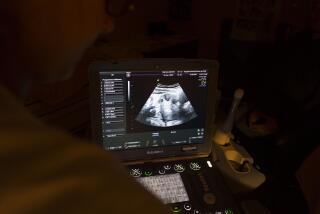Plans for Human Cloning Trigger National Uproar
- Share via
CHICAGO — A scientist’s announcement that he plans to clone humans set off a nationwide clamor Wednesday from doctors who say it can’t be done, ethicists who say it shouldn’t be done and politicians who say they won’t let it be done.
At the center of the uproar is Richard Seed, a physicist and self-described eccentric with a doctorate from Harvard who is unaffiliated with any institution. He says he has the expertise and the couples willing to take part, if he can set up an independent laboratory and raise the $2 million he estimates is needed.
Seed scoffed at the widespread opposition to the concept.
“New things of any kind, mechanical, biological, intellectual, always tend to create fear,” Seed said. “Then the subject becomes tolerated and ignored. And the third stage, which always happens, is the subject becomes enthusiastically endorsed, and I think the same thing will happen in human cloning.”
Researchers said cloning humans might one day be possible but would be inefficient, pointing out that a Scottish team went through 277 sheep before cloning the adult sheep Dolly last year.
“The idea of setting up a human cloning clinic is kind of a crackpot notion, even forgetting the ethical issues, because the effectiveness rate would be so low,” said Dr. Sherman Silber, director of the Infertility Center of St. Louis.
Dr. Lawrence Layman, chief of reproductive endocrinology and infertility at the University of Chicago Hospitals, said: “It’s not like he can just throw together a lab and just do it.”
White House Press Secretary Mike McCurry said: “The scientific community ought to make it clear to Dr. Seed--and I think the president will make it clear to Dr. Seed--that he has elected to become irresponsible, unethical and unprofessional should he pursue the course that he outlined.”
House Majority Leader Dick Armey (R-Texas) said Congress should ban human cloning quickly, and Sen. Christopher S. Bond (R-Mo.), who introduced such legislation last year, said he would push for emergency action when Congress reconvenes later this month.
A national panel recommended last year after Dolly’s cloning that Congress outlaw human cloning, saying that the technique posed unacceptable risks of mutations and raised troubling ethical questions.
President Clinton has barred the use of federal funds for human cloning, and a bill to make his order permanent is among several anti-cloning measures in Congress.
Seed, who describes himself as “eccentric or brilliant or near-genius,” said he hopes to begin his work within the next few months and set a goal of producing a pregnancy in a woman within 1 1/2 years.
He suggested that the techniques would be similar to those used to create the cloned sheep. DNA would be removed from a woman’s egg and replaced with the DNA from the person to be cloned. The fertilized egg would grow into an embryo that would be placed into the woman, who would give birth to the cloned child.
Seed and his brother developed a technique for transferring fertilized embryos from one woman to another in the early 1980s but failed in their attempt to make the procedure a commercial success.






